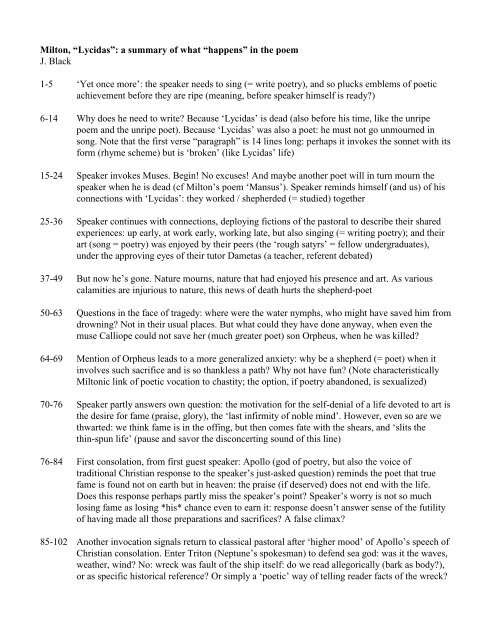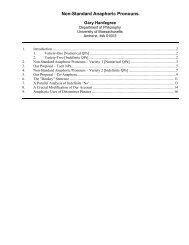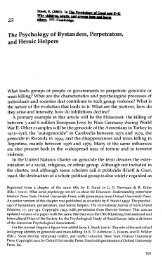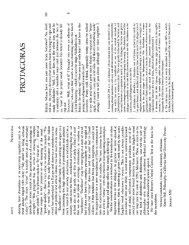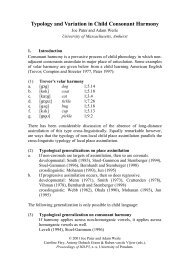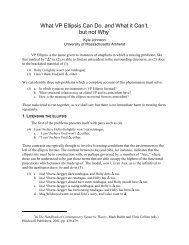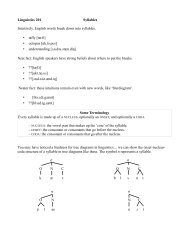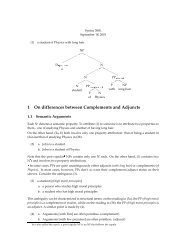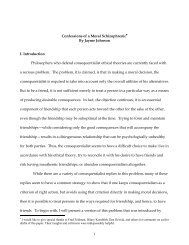Milton, “Lycidas”: a summary of what “happens” in the poem J. Black ...
Milton, “Lycidas”: a summary of what “happens” in the poem J. Black ...
Milton, “Lycidas”: a summary of what “happens” in the poem J. Black ...
You also want an ePaper? Increase the reach of your titles
YUMPU automatically turns print PDFs into web optimized ePapers that Google loves.
<strong>Milton</strong>, <strong>“Lycidas”</strong>: a <strong>summary</strong> <strong>of</strong> <strong>what</strong> <strong>“happens”</strong> <strong>in</strong> <strong>the</strong> <strong>poem</strong><br />
J. <strong>Black</strong><br />
1-5 „Yet once more‟: <strong>the</strong> speaker needs to s<strong>in</strong>g (= write poetry), and so plucks emblems <strong>of</strong> poetic<br />
achievement before <strong>the</strong>y are ripe (mean<strong>in</strong>g, before speaker himself is ready?)<br />
6-14 Why does he need to write? Because „Lycidas‟ is dead (also before his time, like <strong>the</strong> unripe<br />
<strong>poem</strong> and <strong>the</strong> unripe poet). Because „Lycidas‟ was also a poet: he must not go unmourned <strong>in</strong><br />
song. Note that <strong>the</strong> first verse “paragraph” is 14 l<strong>in</strong>es long: perhaps it <strong>in</strong>vokes <strong>the</strong> sonnet with its<br />
form (rhyme scheme) but is „broken‟ (like Lycidas‟ life)<br />
15-24 Speaker <strong>in</strong>vokes Muses. Beg<strong>in</strong>! No excuses! And maybe ano<strong>the</strong>r poet will <strong>in</strong> turn mourn <strong>the</strong><br />
speaker when he is dead (cf <strong>Milton</strong>‟s <strong>poem</strong> „Mansus‟). Speaker rem<strong>in</strong>ds himself (and us) <strong>of</strong> his<br />
connections with „Lycidas‟: <strong>the</strong>y worked / shepherded (= studied) toge<strong>the</strong>r<br />
25-36 Speaker cont<strong>in</strong>ues with connections, deploy<strong>in</strong>g fictions <strong>of</strong> <strong>the</strong> pastoral to describe <strong>the</strong>ir shared<br />
experiences: up early, at work early, work<strong>in</strong>g late, but also s<strong>in</strong>g<strong>in</strong>g (= writ<strong>in</strong>g poetry); and <strong>the</strong>ir<br />
art (song = poetry) was enjoyed by <strong>the</strong>ir peers (<strong>the</strong> „rough satyrs‟ = fellow undergraduates),<br />
under <strong>the</strong> approv<strong>in</strong>g eyes <strong>of</strong> <strong>the</strong>ir tutor Dametas (a teacher, referent debated)<br />
37-49 But now he‟s gone. Nature mourns, nature that had enjoyed his presence and art. As various<br />
calamities are <strong>in</strong>jurious to nature, this news <strong>of</strong> death hurts <strong>the</strong> shepherd-poet<br />
50-63 Questions <strong>in</strong> <strong>the</strong> face <strong>of</strong> tragedy: where were <strong>the</strong> water nymphs, who might have saved him from<br />
drown<strong>in</strong>g? Not <strong>in</strong> <strong>the</strong>ir usual places. But <strong>what</strong> could <strong>the</strong>y have done anyway, when even <strong>the</strong><br />
muse Calliope could not save her (much greater poet) son Orpheus, when he was killed?<br />
64-69 Mention <strong>of</strong> Orpheus leads to a more generalized anxiety: why be a shepherd (= poet) when it<br />
<strong>in</strong>volves such sacrifice and is so thankless a path? Why not have fun? (Note characteristically<br />
<strong>Milton</strong>ic l<strong>in</strong>k <strong>of</strong> poetic vocation to chastity; <strong>the</strong> option, if poetry abandoned, is sexualized)<br />
70-76 Speaker partly answers own question: <strong>the</strong> motivation for <strong>the</strong> self-denial <strong>of</strong> a life devoted to art is<br />
<strong>the</strong> desire for fame (praise, glory), <strong>the</strong> „last <strong>in</strong>firmity <strong>of</strong> noble m<strong>in</strong>d‟. However, even so are we<br />
thwarted: we th<strong>in</strong>k fame is <strong>in</strong> <strong>the</strong> <strong>of</strong>f<strong>in</strong>g, but <strong>the</strong>n comes fate with <strong>the</strong> shears, and „slits <strong>the</strong><br />
th<strong>in</strong>-spun life‟ (pause and savor <strong>the</strong> disconcert<strong>in</strong>g sound <strong>of</strong> this l<strong>in</strong>e)<br />
76-84 First consolation, from first guest speaker: Apollo (god <strong>of</strong> poetry, but also <strong>the</strong> voice <strong>of</strong><br />
traditional Christian response to <strong>the</strong> speaker‟s just-asked question) rem<strong>in</strong>ds <strong>the</strong> poet that true<br />
fame is found not on earth but <strong>in</strong> heaven: <strong>the</strong> praise (if deserved) does not end with <strong>the</strong> life.<br />
Does this response perhaps partly miss <strong>the</strong> speaker‟s po<strong>in</strong>t? Speaker‟s worry is not so much<br />
los<strong>in</strong>g fame as los<strong>in</strong>g *his* chance even to earn it: response doesn‟t answer sense <strong>of</strong> <strong>the</strong> futility<br />
<strong>of</strong> hav<strong>in</strong>g made all those preparations and sacrifices? A false climax?<br />
85-102 Ano<strong>the</strong>r <strong>in</strong>vocation signals return to classical pastoral after „higher mood‟ <strong>of</strong> Apollo‟s speech <strong>of</strong><br />
Christian consolation. Enter Triton (Neptune‟s spokesman) to defend sea god: was it <strong>the</strong> waves,<br />
wea<strong>the</strong>r, w<strong>in</strong>d? No: wreck was fault <strong>of</strong> <strong>the</strong> ship itself: do we read allegorically (bark as body?),<br />
or as specific historical reference? Or simply a „poetic‟ way <strong>of</strong> tell<strong>in</strong>g reader facts <strong>of</strong> <strong>the</strong> wreck?
103-07 Enter Camus, personification <strong>of</strong> Cambridge University, to mourn his „dearest pledge‟<br />
108-31 Enter St Peter, with keys and mitre (headwear that emblematizes his role as bishop), mourn<strong>in</strong>g<br />
untimely loss <strong>of</strong> young m<strong>in</strong>ister (some argue that this figure is Christ, but <strong>the</strong> implicitly cited<br />
biblical passages fit Peter better. Fur<strong>the</strong>rmore, Triton speaks on behalf <strong>of</strong> Neptune as Peter<br />
himself is agent <strong>of</strong> a greater power). He bemoans current state <strong>of</strong> <strong>the</strong> m<strong>in</strong>istry, us<strong>in</strong>g „pastoral‟<br />
imagery: greedy wolves (clerics) pretend to be pastors, are „bl<strong>in</strong>d mouths‟ („bishop‟<br />
etymologically is „one who sees‟), write terrible poetry (note sound <strong>of</strong> verse); <strong>the</strong>ir sheep go<br />
unfed. And <strong>the</strong> big bad wolf (= Catholicism: <strong>the</strong> Jesuit order had wolves on its coat <strong>of</strong> arms)<br />
lurks unreproved („noth<strong>in</strong>g said‟ here; „little said‟ <strong>in</strong> <strong>Milton</strong>‟s manuscript). <strong>Milton</strong> foregrounds<br />
this passage <strong>in</strong> his headnote to <strong>the</strong> 1645 pr<strong>in</strong>t<strong>in</strong>g. The „two-handed eng<strong>in</strong>e‟ is a famous crux:<br />
usually <strong>in</strong>terpreted as a sword, as <strong>in</strong> Revelation (= word <strong>of</strong> God); or Michael‟s <strong>in</strong> PL.<br />
132-53 Return to (Sicilian, Theocritan) pastoral after <strong>in</strong>trusion <strong>of</strong> a different poetic register: note how<br />
pastoral mode is a vehicle for political and religious commentary. Return br<strong>in</strong>gs affirmation <strong>of</strong><br />
life and beauty: throw your flowers (= poetic tropes) on his grave. Read aloud <strong>the</strong> lovely list <strong>of</strong><br />
flowers, and note <strong>the</strong> beautiful, solitary (poetically) „glow<strong>in</strong>g violet‟. All this though is a<br />
pretense, because <strong>the</strong> body is gone, <strong>the</strong>re is no hearse. (And also because flowers do not mourn:<br />
nature is neutral? Calls attention to poetic fiction?)<br />
154-64 No body, because his body is washed north (Hebrides), or south (Cornwall); look homeward<br />
angel (Michael, on mount) and take pity; and dolph<strong>in</strong>s, br<strong>in</strong>g him home<br />
165-85 F<strong>in</strong>al, Christian consolation: weep no more, because „Lycidas‟ is dead, but not dead: he will rise<br />
to heaven, his body washed; he will hear <strong>the</strong> nuptial song (<strong>in</strong> Christian devotional metaphor, we<br />
collectively are <strong>the</strong> „bride‟ <strong>of</strong> Christ). Sa<strong>in</strong>ts <strong>the</strong>re s<strong>in</strong>g to him, console him: „Lycidas‟ is now a<br />
local deity, not mourned, but celebrated, will do good to o<strong>the</strong>rs.<br />
186-93 Back to frame narrative: <strong>the</strong> fate <strong>of</strong> „Lycidas‟ is now settled: <strong>what</strong> about speaker? We pan back,<br />
hear him s<strong>in</strong>g<strong>in</strong>g his pastoral song, all day. Sun is now sett<strong>in</strong>g; he twitches his mantle blue (<strong>the</strong><br />
color <strong>of</strong> hope), tomorrow to fresh woods, and pastures new. What are <strong>the</strong>se pastures? You might<br />
want to th<strong>in</strong>k about <strong>the</strong> implications <strong>of</strong> poetic form: <strong>the</strong> f<strong>in</strong>al eight l<strong>in</strong>es are <strong>in</strong> „ottava rima‟, <strong>the</strong><br />
dom<strong>in</strong>ant form <strong>of</strong> epic narrative verse <strong>in</strong> <strong>the</strong> Renaissance, used by Ariosto <strong>in</strong> Orlando Furioso,<br />
Tasso <strong>in</strong> Jerusalem Delivered, Camoens <strong>in</strong> Os Lusiads, and <strong>in</strong> English translations <strong>of</strong> epic<br />
narrative <strong>poem</strong>s (also, for that matter, by Byron <strong>in</strong> Don Juan, Shelley <strong>in</strong> „Witch <strong>of</strong> Atlas‟, and<br />
Yeats <strong>in</strong> „Among School Children‟ and „Sail<strong>in</strong>g to Byzantium‟). What might this mean?<br />
General questions to ponder:<br />
1) <strong>“Lycidas”</strong> is probably <strong>the</strong> most famous “pastoral elegy” <strong>in</strong> English literature. What conventions or<br />
expectations come to m<strong>in</strong>d when you hear <strong>the</strong> words “pastoral” and “elegy”?<br />
2) Many people f<strong>in</strong>d <strong>the</strong> essential artifice <strong>of</strong> <strong>the</strong> pastoral mode <strong>in</strong>s<strong>in</strong>cere, irritat<strong>in</strong>g, hard to stomach (cf.<br />
Samuel Johnson). But do we still produce and <strong>in</strong> fact enjoy “pastoral” art? (You might want to f<strong>in</strong>d a<br />
def<strong>in</strong>ition <strong>of</strong> “pastoral” onl<strong>in</strong>e, or <strong>in</strong> a book <strong>of</strong> literary terms). Th<strong>in</strong>k <strong>of</strong> possible examples.<br />
3) As an elegy, <strong>“Lycidas”</strong> ostensibly is about a young man who drowned. But is that <strong>what</strong> <strong>the</strong> <strong>poem</strong><br />
seems to be really about? What (e.g.) does <strong>the</strong> <strong>poem</strong> tell us about <strong>the</strong> speaker?


